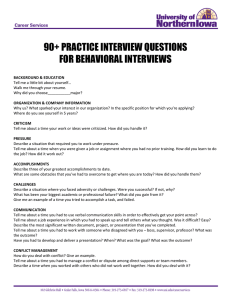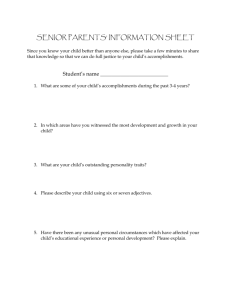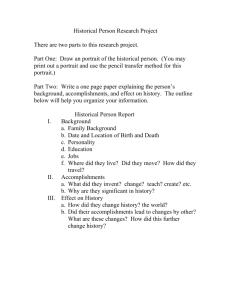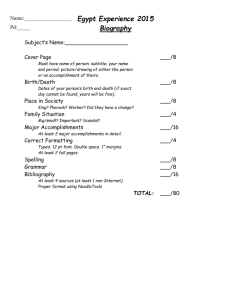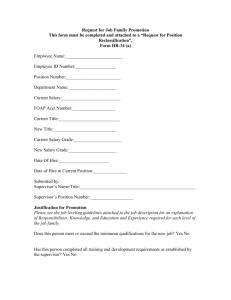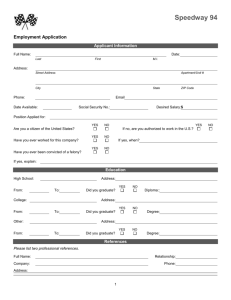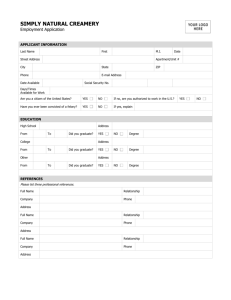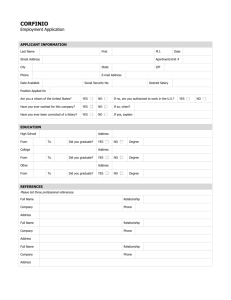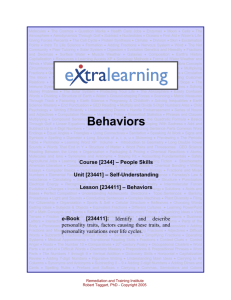Fifty Questions to Expect During a Job Interview
advertisement
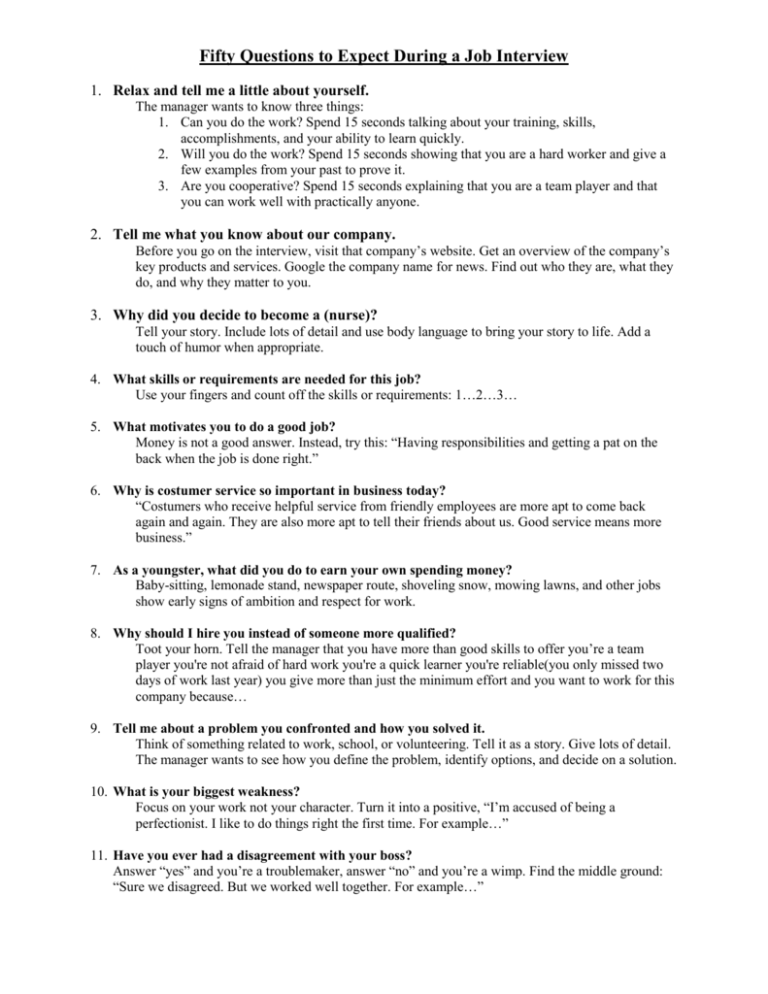
Fifty Questions to Expect During a Job Interview 1. Relax and tell me a little about yourself. The manager wants to know three things: 1. Can you do the work? Spend 15 seconds talking about your training, skills, accomplishments, and your ability to learn quickly. 2. Will you do the work? Spend 15 seconds showing that you are a hard worker and give a few examples from your past to prove it. 3. Are you cooperative? Spend 15 seconds explaining that you are a team player and that you can work well with practically anyone. 2. Tell me what you know about our company. Before you go on the interview, visit that company’s website. Get an overview of the company’s key products and services. Google the company name for news. Find out who they are, what they do, and why they matter to you. 3. Why did you decide to become a (nurse)? Tell your story. Include lots of detail and use body language to bring your story to life. Add a touch of humor when appropriate. 4. What skills or requirements are needed for this job? Use your fingers and count off the skills or requirements: 1…2…3… 5. What motivates you to do a good job? Money is not a good answer. Instead, try this: “Having responsibilities and getting a pat on the back when the job is done right.” 6. Why is costumer service so important in business today? “Costumers who receive helpful service from friendly employees are more apt to come back again and again. They are also more apt to tell their friends about us. Good service means more business.” 7. As a youngster, what did you do to earn your own spending money? Baby-sitting, lemonade stand, newspaper route, shoveling snow, mowing lawns, and other jobs show early signs of ambition and respect for work. 8. Why should I hire you instead of someone more qualified? Toot your horn. Tell the manager that you have more than good skills to offer you’re a team player you're not afraid of hard work you're a quick learner you're reliable(you only missed two days of work last year) you give more than just the minimum effort and you want to work for this company because… 9. Tell me about a problem you confronted and how you solved it. Think of something related to work, school, or volunteering. Tell it as a story. Give lots of detail. The manager wants to see how you define the problem, identify options, and decide on a solution. 10. What is your biggest weakness? Focus on your work not your character. Turn it into a positive, “I’m accused of being a perfectionist. I like to do things right the first time. For example…” 11. Have you ever had a disagreement with your boss? Answer “yes” and you’re a troublemaker, answer “no” and you’re a wimp. Find the middle ground: “Sure we disagreed. But we worked well together. For example…” 12. Tell me about the toughest boss you ever had. “That would be Mr. Gray. He was a demanding, detail-driven perfectionist. But, I learned more from him than anyone I’ve ever worked with. For instance…” 13. Who did you ask to serve as personal references and why did you choose them? “I chose a good mix—a former boss who can tell you about my skills and job performance—a coworker who can tell you about the hard work and extra effort we put in as a team—and a coach who can tell you that I’m not only a good team player, I can work independently and I always complete my share of the work.” 14. What salary were you paid on your last job? Tell the truth. 15. In your last job, how much overtime did you average each week? The manager wants to know if you can be counted on to help out when the work piles up. Explain that you can be counted on to work late whenever the need arises. 16. What salary are you looking for? “What salary do you usually offer someone with my skills and abilities?” 17. What do you do to relax after work? Don’t brag about auto racing, skydiving, scuba diving, or any other sport that might be dangerous. They suggest a likelihood of injury and an absence from work. Instead, mention something wholesome like athletics, a hobby, and a project, traveling, or entertaining friends. 18. How long do you plan to work here? “A long time. This is the job I’ve been looking for.” 19. Tell me about your current (or last) job. List your duties and responsibilities. Explain your accomplishments. 20. Why are you leaving that job? Job stagnation, demotions due to downsizing, career exploration, or simply having made a bad choice are all good reasons. 21. Are you planning to give notice that you’re leaving for another job? Explain that you don’t want to leave them shorthanded. A two-week notice is customary. 22. What will your manager say when you give notice that you are leaving? Explain why you’ll be missed. Don’t give the impression that they’ll be glad to be rid of you. 23. What did you like most about that job? Talk about your responsibilities, challenges, accomplishments, and the people. 24. What would you change about that job? Don’t bad-mouth the job. Explain that you’d want more responsibility. It shows initiative. 25. What do you think are the most important abilities that lead to success on the job? Three things—a desire to learn the job—a desire to do good work—and a desire to be friendly and cooperative. 26. Tell me about your education or training. Explain your education or training. Then, tell how it helped prepare you for the job you want. 27. Did you enjoy school? Why? The manager wants to know if you enjoy learning and whether you might benefit from a training program. 28. Which course did you find most difficult? Why? The manager wants to know if you have perseverance: “My first term in algebra, I got a D. My study skills were all wrong. I joined a study group. By third term I pulled it up to a B and kept it there.” 29. Did you join any school activities? Why? School activities show that you’re sociable. They show that you enjoy being part of a group and that you can work with other people. This is important in the work place. 30. How were you grades in math? The job may require basic math skills like addition, subtraction, multiplication, and percentages.”I didn’t like algebra, by my basic math skills are good.” 31. How were your grades in English? The job may require that you read and write reports, letters, and memos. 32. Do you plan to continue your education? Adding to your education says that you want to grow and prosper, professionally as well as personally. 33. What are your goals—where do you expect to be five years from now? Figure the promotions you should get if you work hard for this company over the next five years. Tell the manager you plan to be working for him or her in that position. 34. When do you hope to retire? “Certainly, not before I’m 65” 35. In your lifetime, what was your greatest accomplishment? What did you learn from it? A personal touch works well here, such as your marriage, birth of a child, or helping someone in need. 36. Have you ever been convicted of a crime? It’s not illegal to ask this question if it has a bearing on the job you are seeking. A bank, for example, wouldn’t want a convicted embezzler working in the vault. If you have a conviction, admit it. Explain what happened. Admit that you made a huge mistake. Tell what you’ve done to make amends. Ask for a chance to prove yourself. 37. What was your greatest failure? What did you learn from it? Fessing up to a failure shows maturity. Avoid examples that might reflect on your ability to do the job. 38. Do you have a drug or alcohol problem? If you do, get some help. Enroll in a program. 39. Last year, how many days of work (or school) did you miss? How many days were you late? This will tell the manager whether you’re going to show up for work on time every day. If you’ve missed more than a couple of days, have some good explanations ready. 40. Are you at your best when working alone or in a group? “Both. I enjoy working as part of a team and I can work independently to get my share of the work done.” 41. Would you rather be in charge of a project or work as part of a team? “Either. I’m not afraid to take responsibility and I’m not afraid to roll up my sleeves and pitch in.” 42. What would you do if one supervisor told you to do something now and another supervisor told you to do it later? The manager wants to see how you would handle conflict. How would you handle it? 43. Give me two reasons why I should NOT hire you? You’re on your own. 44. Who are your heroes? Why? Think about it! 45. What do you like most about yourself? Least? Stress the positives (see #10). 46. Describe you “dream job.” Your dream job is the job you are seeking and the company you are interviewing. 47. If you were told to report to a supervisor who was a woman, a minority, or someone with a physical disability, what problems would this cause for you? You’re on your own. 48. Have you ever been fired from a job? Why? If you have, explain that you usually get along really well with everyone. But, you and your exmanager just couldn’t seem to make things work. 49. Okay, you’ve got one minute to convince me that you’re the best candidate for this job. Begin. Spend 15 seconds explaining why you’re hooked on this company. Spend 15 seconds talking about your training, skills, accomplishments, and your ability to learn quickly. Spend 15 seconds showing that you are a hard worker and give a few examples from your past to prove it. Spend 15 seconds explaining that you are a team player and that you can work well with practically anyone. 50. Do you have any questions for me? “Yes, thank you, I do.” (Ask intelligent questions that show you’re looking out for your own welfare and happiness.)
